| Srl | Item |
| 1 |
ID:
060345
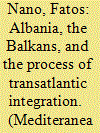

|
|
|
| 2 |
ID:
057795
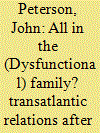

|
|
|
| 3 |
ID:
073663
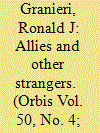

|
|
|
|
|
| Publication |
2006.
|
| Summary/Abstract |
Current tensions between the United States and Europe have raised questions about the future of the transatlantic relationship, though historical analysis suggests that the good old days were not perfect either. This article considers the history of U.S.-European relations and concludes that they have always been complex, as neither Americans nor Europeans have been sure how an integrated Europe would fit into an Atlantic partnership. It concludes that the future of the West depends on Europeans' developing on their own a clearer vision of the concrete shape and international role of the EU.
|
|
|
|
|
|
|
|
|
|
|
|
|
|
|
|
| 4 |
ID:
052654
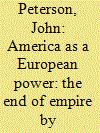

|
|
|
| 5 |
ID:
054616
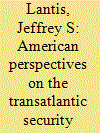

|
|
|
| 6 |
ID:
065562
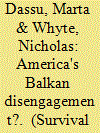

|
|
|
| 7 |
ID:
055510
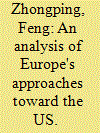

|
|
|
| 8 |
ID:
086335
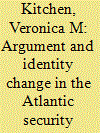

|
|
|
|
|
| Publication |
2009.
|
| Summary/Abstract |
The Atlantic community shares more than just dependable expectations of peaceful change. Its members also share a reflexive political community they sense is worth preserving and a view that their security is intertwined. Existing accounts of the Atlantic security community have identified the importance of renewed emphasis on common values as a factor in preserving and expanding the security community after the Cold War. But, debates at the end of the Cold War also turned on the question of what the allies would do together and what responsibilities they had to each other and to other states. This article outlines a discursive framework and a set of rhetorical strategies used by members of the Atlantic community that explain how they worked to maintain and change their community during debates about their mandate for cooperation. This framework is then applied to the Atlantic community's debates over common action during the Yugoslav wars.
|
|
|
|
|
|
|
|
|
|
|
|
|
|
|
|
| 9 |
ID:
077754
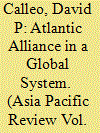

|
|
|
|
|
| Publication |
2007.
|
| Summary/Abstract |
The war in Iraq led to a confrontation between emerging American and European models for global governance. In imagining the future, each has tended to project its own positive experience in the Cold War years. Europeans imagine a multilateral concert, with confederal institutions encouraging mutual appeasement. Americans imagine a benevolent unipolar hegemony. Experience in the 1990s reinforced America's unipolar perspectives. Trends in the new century make Europe's model seem better adapted to an increasingly plural world system. The conclusion speculates on the European model's relevance to Asia. Much will depend on whether China and Japan can replicate the Franco-German reconciliation. China may have more success "containing" the US within a larger Eurasian or even UN context, including, in some fashion, Europe and the US. Conceivably the Western powers may more easily balance their own relations in a Eurasian rather than transatlantic geopolitical framework.
|
|
|
|
|
|
|
|
|
|
|
|
|
|
|
|
| 10 |
ID:
052656
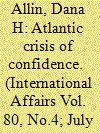

|
|
|
| 11 |
ID:
064946
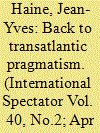

|
|
|
|
|
| Publication |
Apr-Jun 2005.
|
|
|
|
|
|
|
|
|
|
|
|
|
|
|
|
| 12 |
ID:
083055
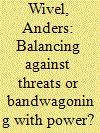

|
|
|
|
|
| Publication |
2008.
|
| Summary/Abstract |
The United States has played an important role in European security since the early 20th century. From the time of the end of the Cold War, this role has changed as a consequence of the lack of a common territorial threat and the overwhelming power of the United States relative to Europe. How have European states responded to the challenges of the American world order? Are they adapting their security policies to match the challenges of US security policy and the American world order? What are the implications of the European response for the transatlantic relationship? This article seeks to describe and explain European security behaviour in the American world through the prism of two realist theories: balance of power realism and balance of threat realism. Despite sharing a common starting point in realist assumptions, each theory allows us to tell a different story about Europe's position in the American world order as well as the opportunities and challenges it faces
|
|
|
|
|
|
|
|
|
|
|
|
|
|
|
|
| 13 |
ID:
054610
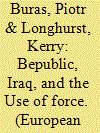

|
|
|
| 14 |
ID:
066193


|
|
|
| 15 |
ID:
064497
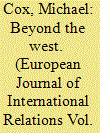

|
|
|
| 16 |
ID:
051119
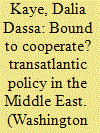

|
|
|
| 17 |
ID:
023327
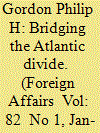

|
|
|
|
|
| Publication |
Jan-Feb 2003.
|
| Description |
70-83
|
|
|
|
|
|
|
|
|
|
|
|
|
|
|
|
| 18 |
ID:
059916
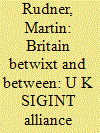

|
|
|
| 19 |
ID:
051117
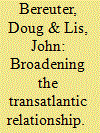

|
|
|
| 20 |
ID:
053641
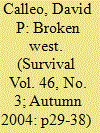

|
|
|
|
|
| Publication |
2004.
|
| Description |
p29-38
|
| Summary/Abstract |
Deep political fissures have opened in the West. Contending visions of the future have arisen on each side of the Atlantic. America, driven by its outsize military and economic strength, has developed a unipolar, hegemonic vision of the future. Europe pursues its own self-sustaining union of nation states that points towards a pluralist world order that is multipolar, balanced and multilateral. The future of the West, and perhaps of the world, will depend on whether these two visions can accommodate each other sufficiently to establish a harmonious balance. However, without a more coherent and integrated Europe and a revival of American appreciation for constitutional balance, America's imperial fantasies and Europe's constitutional dreams may well defeat each other.
|
|
|
|
|
|
|
|
|
|
|
|
|
|
|
|